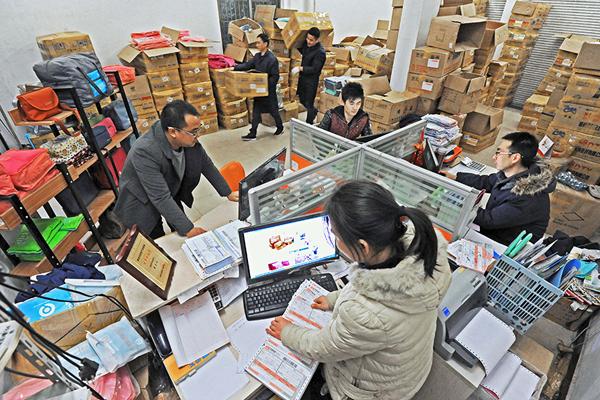
BEIJING, July 10 (Xinhua) -- Every day, Chen Yandong handles dozens of packages for the residents in Gaozhai Village in northwest China's Gansu Province.
From appliances such as refrigerators and air conditioners to daily necessities like razors and toothpaste, Chen is amazed by how residents of the remote village make the most of their Internet connections to add convenience to their lives.
"People are happy to get access to good prices and quality products from online vendors," Chen said.
E-commerce is helping revitalize China's rural villages, home to half of the country's population. It has also emerged as a new growth driver for consumer spending in the world's second largest economy.
China has the world's largest e-commerce market. As the incomes of rural residents increase, growth in online retail purchases by rural shoppers has outpaced their urban counterparts.
China's rural residents spent 894.54 billion yuan (131.47 billion U.S. dollars) online in 2016, accounting for 17.4 percent of the nation's total, according to the Ministry of Commerce.
E-commerce is also opening the doors to the huge rural market for companies and farmers.
Alibaba, which began a rural strategy on its e-commerce platform Taobao in 2014, has set up local service centers in about 30,000 villages across 700 counties to support its e-commerce business and provide delivery services in rural areas.
To meet rising demand, e-commerce giant JD.com is expanding its service center workforce to over 300,000 in rural areas.
Farmers have also raked in handsome profits from selling premium produce online.
Li Chunwang. from Wugong County in Shaanxi Province, has set up a cooperative which purchases fruit from farmers and sells it online. Previously it made an annual income around 3 million yuan. In 2016, the number shot up to nearly 300 million yuan.
The city of Donggang in northeast China's Liaoning province is well-known for its strawberries. In 2016, more than 80 percent of the city's strawberries and strawberry-related products were sold online. In the first three months this year, online sales reached 1.2 million yuan.
Tian Yihong, party secretary of Wugong County, said e-commerce has given local agriculture a boost and farmers no longer remain stuck at the lower end of the value chain.
The government has reiterated its support for e-commerce in underdeveloped rural areas. The Ministry of Commerce announced in October 2016 that "policy support will be given to small online retailers ... to lower their operational costs."
More will be done to support and nurture e-commerce businesses operating in rural regions, and training programs will be offered to small business owners, according to the ministry's website.
As part of the Chinese government's goal to eliminate poverty by 2020, it has created more than one thousand "Taobao villages" over the past decade.
Online sales revenue in 105 national-level poverty-stricken counties, including the model districts lauded by the Ministry of Commerce, reached 220 million yuan on average in 2016.
E-commerce plays a key role in poverty reduction, by not just giving a man a fish, but also teaching him how to fish, said Liu Qiangdong, chairman of JD.com.
Online business owners in rural China topped 8.11 million in 2016, creating over 20 million jobs.
Rural Internet users rose to 201 million, or 27.4 percent of the nation's total.
E-commerce has changed people's lives and their ways of thinking in rural China. Inspired by this good momentum, it is good to see talented people returning to their rural hometowns to start new businesses, said Li Yongjian with the Chinese Academy of Social Sciences.




 A single purchase
A single purchase









